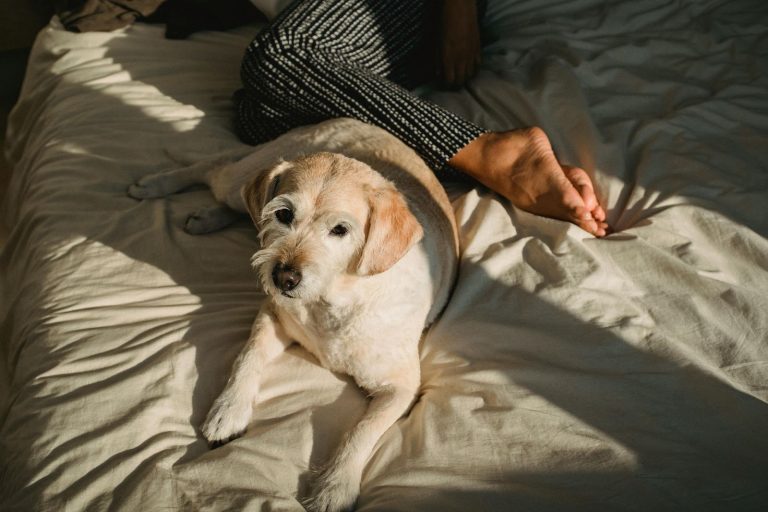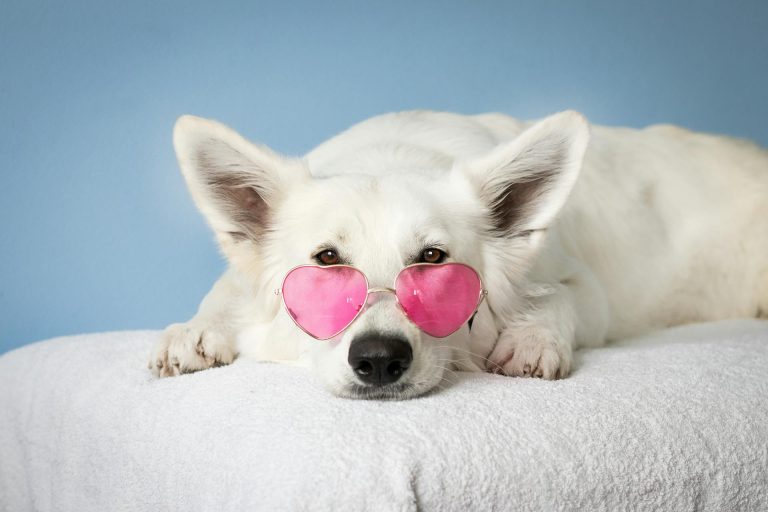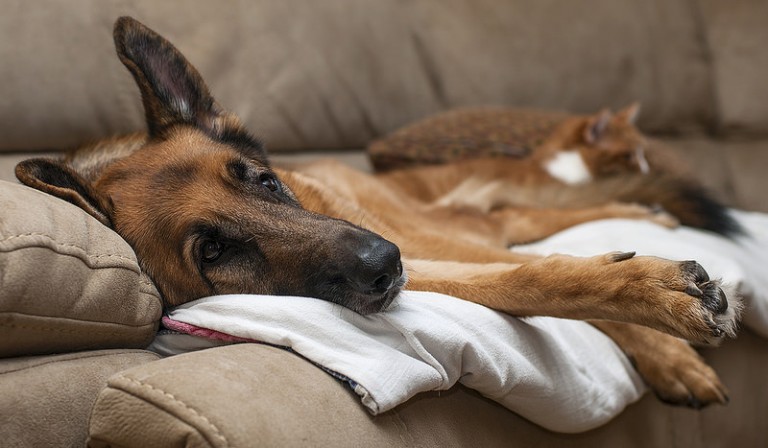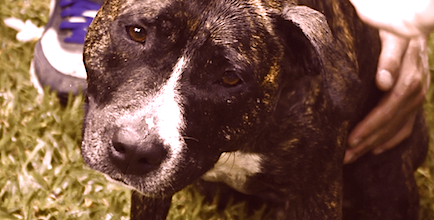Why Does My Puppy Have Bad Breath? (Here Are 6 Possible Reasons.)
Puppy breath is normal until 12 weeks old. Some people like it. But if you think your puppy’s breath is especially bad, here’s what you should know.
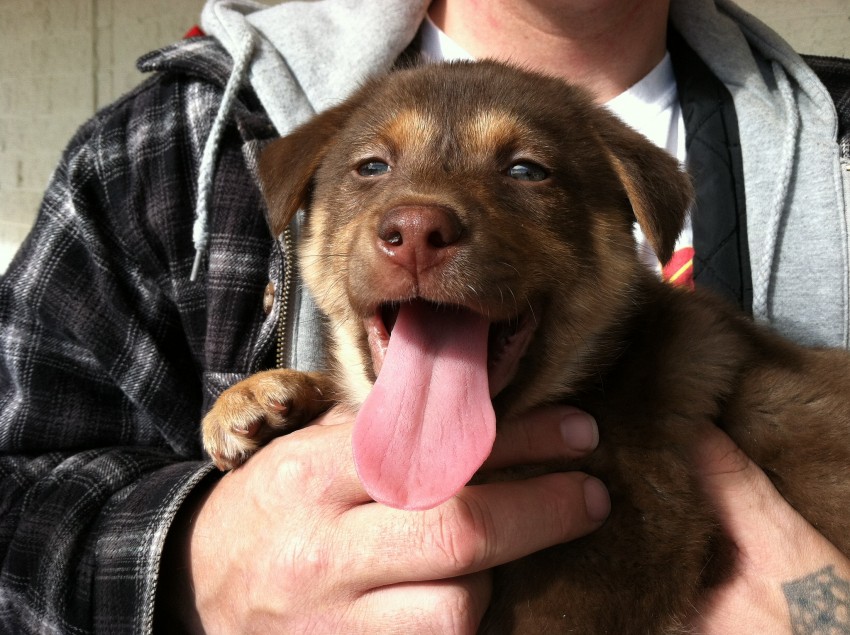
There’s normal puppy breath, which has a distinct odor …
… And then there’s sick puppy breath, meaning the puppy has something wrong creating an abnormal odor from the mouth.
Very young puppies have a distinct smell to their breath, lovingly called puppy breath. It’s usually described as a sweetish smell that many people like.
If you adopted your puppy at a very young age, like 6 weeks old, you are probably aware of this specific breath odor.
Puppy breath begins to wane by 8–10 weeks of age. Although I associate the strong puppy breath smell as something that is hard to smell after 12 weeks, some people think it can linger until 6 months.
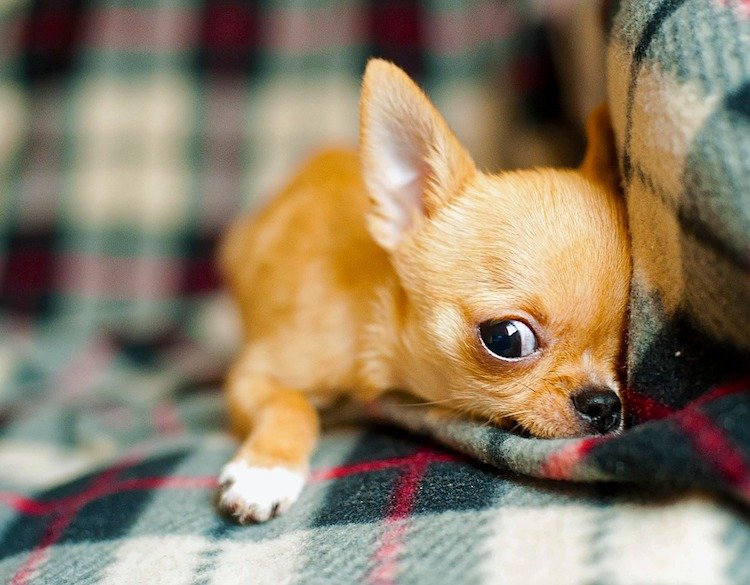

Don’t leave your pet’s safety to chance
Sign up for Petful recall alerts today.

Why I’m Not a Big Fan of Puppy Breath
Whether or not normal puppy breath is pleasant is controversial. Humans have a genetic predisposition to how their noses interpret the specific smells like puppy breath.
I, for one, don’t particularly care for it. My nose smells a heavy, sweet-sour, skunk odor that is not at all pleasant when adorable little pups try to lick my face.
Many other people experience a sweet, pleasant odor and are sad when the puppy grows out of the puppy breath stage.
In fact, if you do a search for “puppy breath” online, you’ll find lots of unscientific opinions that say puppy breath exists to make people fall in love with puppies and not abuse them. If only that were true.
Factors Responsible for Puppy Breath
The scientific explanation is also a bit unscientific.
While we don’t completely understand puppy breath, most veterinary dentists and experts conclude that a number of factors are responsible for puppy breath:
- Sometimes referred to as milk breath, puppy breath is most obvious during nursing and just after the pup is weaned. This is an insufficient explanation, however, since puppy breath lingers for several weeks after weaning.
- Puppy mouths are clean and healthy, harboring none of the oral bacteria common in older dogs.
- The GI tracts of puppies contain different bacteria and flora than do those of adults.
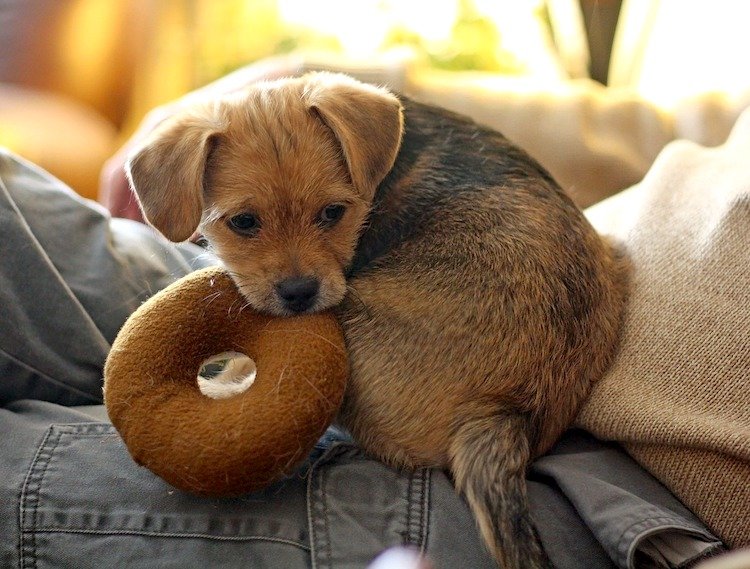
Why Does My Puppy Have Bad Breath?
Even if you aren’t a fan of normal puppy breath, it certainly doesn’t smell foul or sick.
If your pup has a truly bad smell to their breath, here are 6 possible reasons for the odor:
1. Teething
Far and away, the most common cause of unpleasant, bad or different puppy breath is teething.
This is more obvious in some puppies than others. As the pup gets further away from being weaned and is in the true teething stage, the quality of the breath changes.
Here is a timeline of the typical puppy tooth eruption:
- Baby (deciduous) teeth begin to erupt by week 2 or 3.
- All 28 baby teeth are in by week 5 or 6.
- Baby teeth begin to fall out during weeks 12–16.
- Adult teeth are in by 6 months.
When a pup is cutting teeth, there can be inflammation that carries an odor. Sometimes a tooth has a difficult time cutting through, a puppy tooth might fracture, or the pup might be teething so much on toys or treats that it causes very sore gums.
Due to bleeding around the gums, some people think puppy teething has a sort of metallic smell.
Try to avoid extremely hard bones or toys when your pup is very young and teething. Those tiny teeth fracture easily, complicating the loss of baby teeth and the normal eruption of the adult teeth. Veterinary dentists often recommend KONG toys and similar rubbery toys that you can load up with food or treats.
Cool washcloths are better than ice — chewing on ice can cause tooth fracture.
2. Mouth Injury or Difficulty Cutting Teeth
Pups chew on anything and everything, so it is quite common for them to injure their mouths while teething and growing.
Although minor injuries heal quickly since the oral cavity is quick to heal, a foreign body such as a piece of stick or toy can get lodged in the oral cavity, causing a foul odor.
If your pup’s breath is smelling foul, you should check this out with your vet. Most puppies are getting a series of vaccinations during these months, so unless you think there’s a serious and acute problem, most puppy tooth questions can be brought up during your wellness/vaccine appointments.
A very bad smell, however, or a pup showing any oral pain or difficulty chewing requires a vet visit sooner rather than later.
3. Puppy Dietary Indiscretion
“Dietary indiscretion” is a genteel term veterinarians use to describe the non-discerning appetite of puppies. It’s another way of saying puppies will eat just about anything they can get their teeth into, including poop.
Breath can smell bad following a meal of dog poop, cat poop, garbage, decaying leaves, etc.
Think of yourself after a meal of heavy garlic — that everything bagel you had this morning can annoy your friends and family for the rest of the day!
You might actually be able to identify what your puppy ate with careful sniffing. Cat poop is usually highly identifiable.
If you think your puppy’s breath smells bad because of a recent disgusting meal, the good news is that the breath should improve in several hours or in a day.
Try to monitor what your puppy eats. Bad breath is unpleasant, but dietary indiscretion can cause much more serious problems, such as serious vomiting and diarrhea or an intestinal blockage.
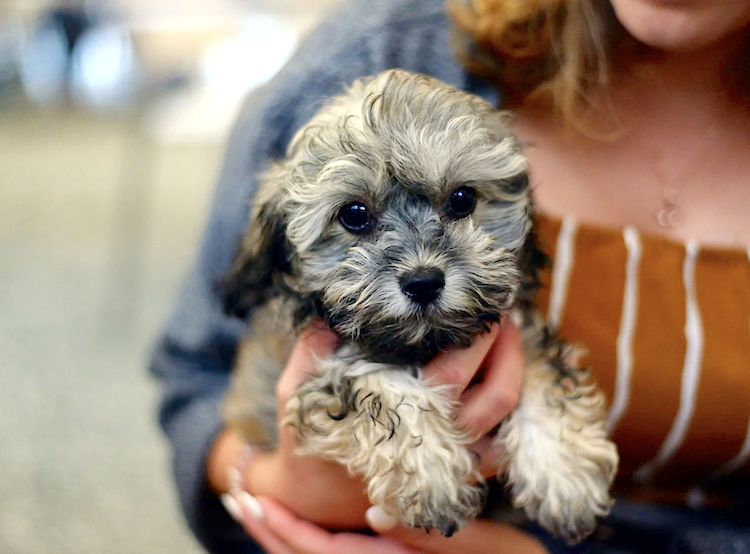
4. Indigestion
Does the food cause bad breath? Probably not. Most vets agree that food does not cause bad breath.
That being said, a certain puppy food may not agree with your pet and may be causing a degree of indigestion.
If a particular food is causing a sour stomach or not being digested easily, you may be confusing “bad breath” with an odor coming from the GI tract.
A bad odor from the GI tract may also be accompanied by excessive belching, passing gas, or vomiting and diarrhea. Consult your vet about food choices.
Your puppy may need a bland diet for 1–2 weeks to get over indigestion. Then you can gradually change the food over a week or so to see if symptoms improve.
5. Periodontal Disease
Young pups rarely have true dental disease. Problems related to gum disease or serious tooth issues do not usually occur before 3 years old.
It’s important, however, to get your puppy used to getting their teeth brushed at an early age.
- Introduce tooth brushing by 6 months of age, or even earlier if possible.
- Brush the teeth at least 3 times a week when your dog is young.
- By 3 years of age, brushing every day is the best way to prevent periodontal and tooth disease.
6. Metabolic Disease
In rare cases, a puppy can have a bad or strange breath odor due to metabolic disease, such as kidney failure.
The pup may be showing other signs and symptoms of illness. Your vet will recommend blood tests as the first diagnostic tool in these atypical cases.
On a much lighter note, check out this fake ad for a new fragrance that will appeal to people who love puppy breath:

Final Thoughts on Puppy Breath
Puppyhood is magical. It’s also challenging.
If you love puppy breath, cherish it — it won’t be there for long. But if you think your young puppy has bad breath that is not going away, check it out with your veterinarian.
References
- Bellows, Jan, DVM, DAVDC. “Bad Breath in Dogs and Cats.” Veterinary Information Network. June 21, 2016. https://veterinarypartner.vin.com/default.aspx?pid=19239&id=4951287.
- Bellows, Jan, DVM, DAVDC. Small Animal Dental Equipment, Materials and Techniques. Wiley. 2019.
- Lobprise, Heidi B., DVM, DAVDC. Wiggs’s Veterinary Dentistry: Principles and Practice. Wiley. 2018.

